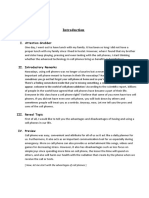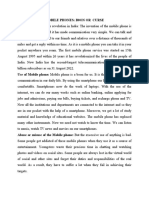How Cell Phones Have Changed Our Lives
Staying in Touch Made Easy
Staying in touch with friends and family is one of the most important things we do
every day. Thanks to cell phones, getting in touch with someone is easier than
ever. Before cell phones, people had to attend meetings in person or go to a
phone booth just to make a call. It was common to wait for a call or to return a
call after hours or even days. Now, with a simple device, we can check our
messages or send a text anytime, anywhere.
Changes in Communication Habits
One of the biggest changes is how communication happens. In the past, people
used to call each other and talk for a long time. Today, many prefer sending texts
or checking their phones quickly instead of making long calls. Sometimes, I nd
myself spending time just scrolling through messages or checking my email even
when I don’t have anything important to do. I really enjoy spending time
connecting with friends, but I also dislike being distracted by my phone when I
should be focusing on other things.
Phone Etiquette and Politeness
When using a phone, it’s important to be polite. For example, during meetings or classes, people should put
their phones on silent or on mute to avoid disturbing others. However, some people turn up the volume and
ignore these rules, which can be rude. Also, when making a call, it’s polite to greet the person properly and to
ask if it’s a good time to talk. In the past, common phone expressions were di erent. People would say, “Is this a
good time to talk?” or “Can I call you back later?” Now, many just send a quick text like “Call me” or “Busy now,
talk later.” I suggest avoiding interrupting someone when they are busy.
Handling Unexpected Calls and Distractions
Sometimes, people get a call at the last minute and have to attend a meeting unexpectedly. This can be
stressful, but cell phones allow us to be ready for anything by checking our schedules or responding to
messages immediately. On the other hand, being constantly connected can make it hard to disconnect and
relax. Many people nd themselves turning down invitations or ignoring friends because they are too focused on
their phones. I feel like spending less time on my phone would help me pay more attention to the people around
me.
Signal Issues and Alternative Communication
Another important point is that sometimes we can’t get a signal, especially in rural areas or underground places.
This reminds us that despite all the technology, cell phones are not perfect. When there is no signal, people have
to nd other ways to get in touch, like using landlines or waiting to send a message later.
Social Media Posting and Responsibility
Cell phones also changed the way we post and delete things on social media. It’s easy to share photos, videos,
or opinions instantly, but sometimes people post without thinking and later regret it, so they have to delete their
posts. This shows how important it is to think before posting and to respect others online. I hope to learn how to
use social media more responsibly.
Faster Communication Today vs. the Past
In the past, communication was slower and required more e ort. People would write letters or wait to meet face
to face. Now, thanks to cell phones, we can stay in contact with anyone in the world almost instantly. This is
very useful for work, school, and personal relationships. For example, students can check their emails for
homework updates, and workers can attend meetings online without leaving home. I would like to choose the
best times to use my phone so I don’t get distracted.
Distractions and Responsible Use
However, one disadvantage of cell phones is that they can make people distracted by noti cations and
messages. Sometimes, I catch myself checking my phone even when I’m with friends or family, which is not
polite. It’s important to learn how to use the phone responsibly and to pay attention to the people around us. I
agree that avoiding excessive phone use is necessary for better relationships.
Passing Time and Managing Phone Use
Also, cell phones allow us to pass the time when we are bored, like waiting for a bus or sitting in a waiting room.
Watching videos, playing games, or checking social media can help us spend time more enjoyably. But it’s easy
to spend too much time on the phone and forget about other important activities, such as reading, exercising, or
talking face to face. I plan to decide when to turn o my phone to focus on other things.
fi
fi
ff
ff
fi
ff
fi






















































































